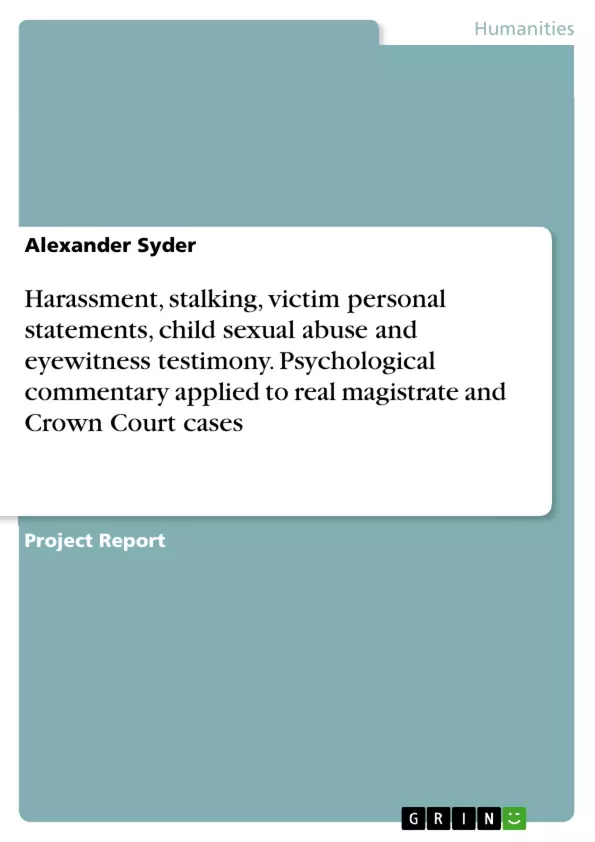Real court cases were used for this report, however no names and official dates are disclosed. The court cases in these examples deal with allegations of stalking and harassment as well as child sexual abuse and involve elements pertaining to Victim Personal Statments and eyewitness testimony.
The first court case examined deals with a case of harassment and stalking and the treatment of Victim Personal Statements as well as police interviewing. An overview is given over the current state of psychological research on both aspects of the case; the offences of harassment and stalking, particularly in heterosexual couple relationships, and on the handling of Victim Personal Statements by police.
The second court case involves allegations of child sexual abuse, with a great lapse in years between perpetration and prosecution. The case summary is followed by a psychological commentary including research findings on the accuracy of eyewitness testimony and the potential impact of child sexual abuse on the victims of abuse.
Inhaltsverzeichnis (Table of Contents)
- Lincoln Magistrates Court: November 2016 – Issues: Harassment; Stalking; and Victim Personal Statements
- Case Summary
- Psychological Commentary: Harassment and Stalking
- Psychological Commentary: Victim Personal Statements and Police Interviewing
- Lincoln Crown Court: December 2016 – Issues: Child Sex Abuse and Eye Witness Testimony
- Case Summary
- Psychological Commentary: Eye Witness Testimony
- Psychological Commentary: Impact of Child Sexual Abuse (CSA)
Zielsetzung und Themenschwerpunkte (Objectives and Key Themes)
This report examines four key areas within the legal system: harassment and stalking, victim personal statements, child sexual abuse, and eye witness testimony. The primary objective is to provide a psychological commentary on each of these areas, drawing on relevant research and legal frameworks.
- The impact of harassment and stalking on victims
- The role and limitations of victim personal statements
- The psychological effects of child sexual abuse
- The reliability of eye witness testimony
- The importance of best practice in police interviewing
Zusammenfassung der Kapitel (Chapter Summaries)
- Lincoln Magistrates Court: November 2016 – Issues: Harassment; Stalking; and Victim Personal Statements: This section focuses on a case involving a defendant accused of harassing and stalking his former partner. The psychological commentary explores the dynamics of control and harassment in relationships, drawing on research on stalking and domestic violence. It also examines the use of victim personal statements and the effectiveness of police interviewing techniques.
- Lincoln Crown Court: December 2016 – Issues: Child Sex Abuse and Eye Witness Testimony: This section analyzes a case involving child sex abuse and the complexities of eye witness testimony. The psychological commentary discusses the impact of child sexual abuse on victims and the factors that can influence the reliability of eyewitness accounts. It also highlights the importance of using appropriate interviewing methods to ensure the accuracy of witness statements.
Schlüsselwörter (Keywords)
The report focuses on key concepts such as harassment, stalking, victim personal statements, child sexual abuse, eye witness testimony, police interviewing, domestic violence, control, and psychological impact. It also explores legal frameworks such as the Protection of Freedoms Act 2012 and the Violence Against Women's Act 1994.
- Citar trabajo
- Alexander Syder (Autor), 2016, Harassment, stalking, victim personal statements, child sexual abuse and eyewitness testimony. Psychological commentary applied to real magistrate and Crown Court cases, Múnich, GRIN Verlag, https://www.grin.com/document/352075



